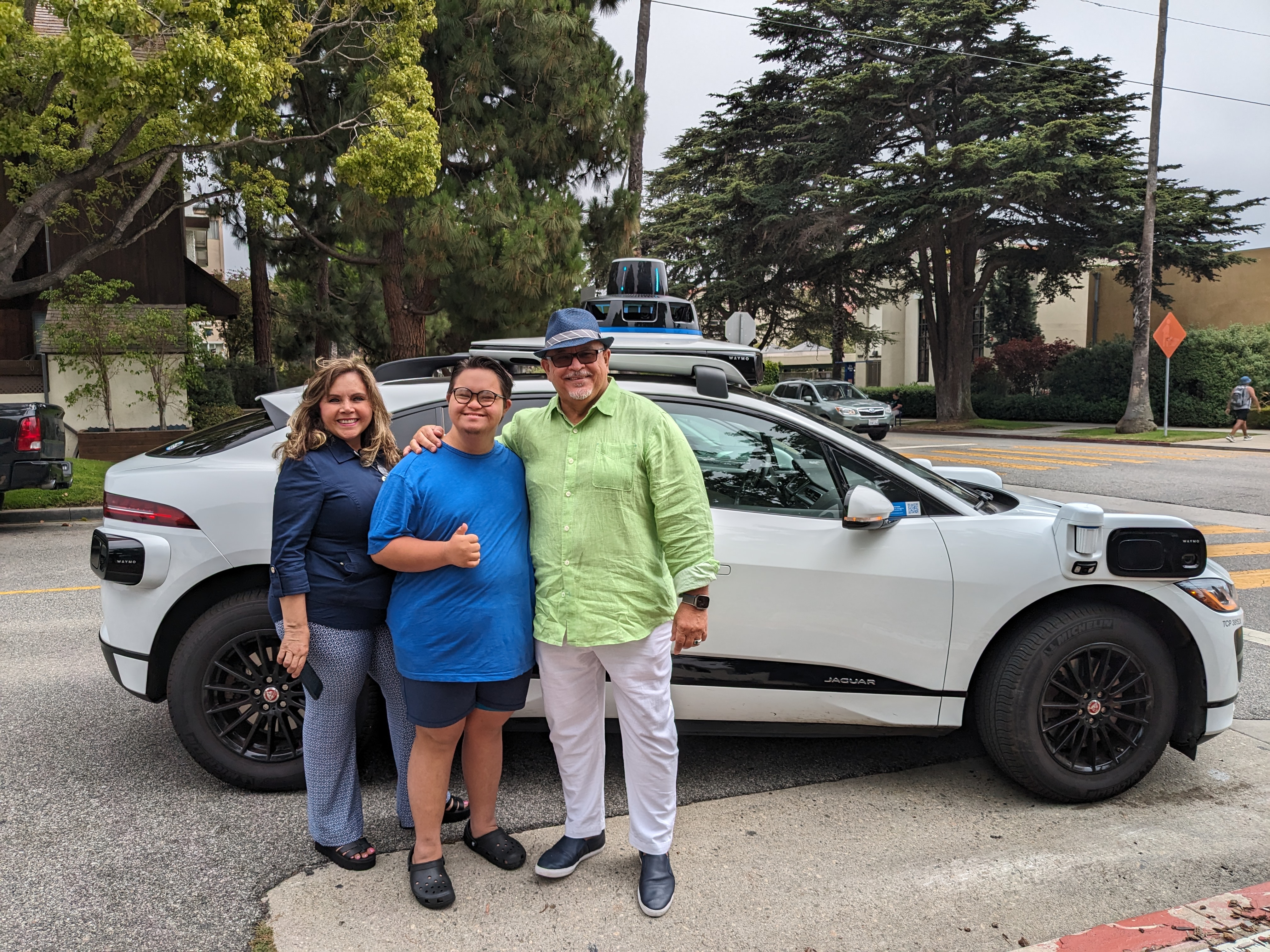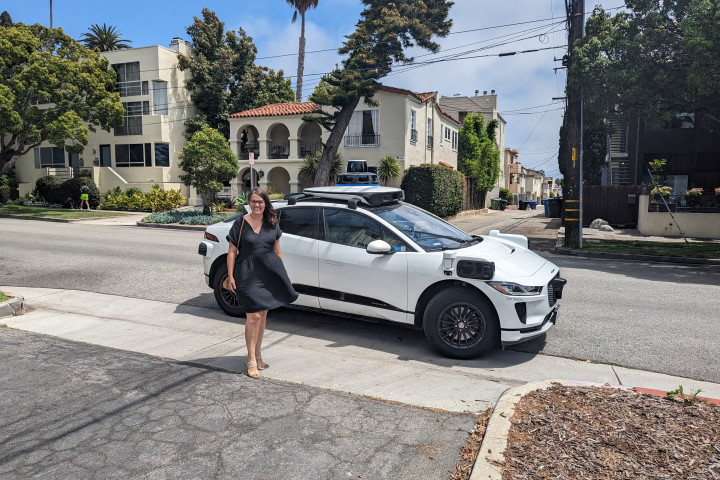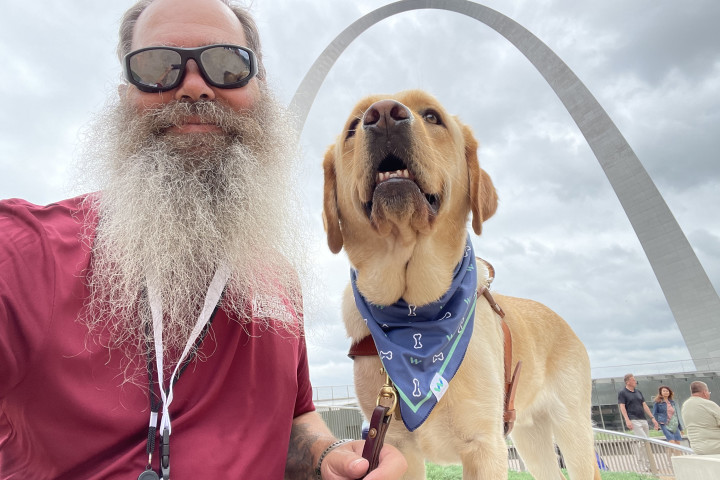Driving Independence for People with Disabilities in LA: Integrated Community Collaborative & Easterseals ride with Waymo
February 6, 2024

Fernando Gomez with his wife, Elizabeth, and son, Oscar, in front of a Waymo One autonomous vehicle
Fernando Gomez remembers the days earlier this year when he first saw Waymo vehicles on the streets of Los Angeles.
“I pulled up alongside it and I made a note of it and I actually meant to sit down and research what and who Waymo was,” Gomez recalls.
Then, a few days later, he was at the Epilepsy Walk Los Angeles in Pasadena at The Rose Bowl.
A team member with Waymo, an autonomous driving technology company expanding its ride-hailing service to LA, introduced the technology designed to remain constantly vigilant, comply with road rules, and make driving decisions to keep everyone on the road safe.
“I found out what Waymo was, and of course, my advocacy mindset starts kicking in… I realized this is the perfect solution for our community,” Gomez shares.
Gomez’s son, Oscar Antonio, was born with Down syndrome and Gomez has dedicated his life to advocating for the disability community.
“I don’t have a son with Down syndrome, we are a family with Down syndrome,” Gomez emphasizes.
Gomez co-founded a grant- and donation-funded peer support network called Integrated Community Collaborative (ICC) in 2018. His wife, Elizabeth Barrios Gomez, serves as the executive director.
“We're not case workers, social workers. What we are is peers. We understand you, we've lived what you're living through and we just know that you need someone to be there for that support,” Gomez explains.
Gomez says the nonprofit aims to transform the world from one where people with Down syndrome face institutional obstacles and judgment to a world of inclusion and acceptance.
Gomez says he sees how Waymo could help people with Down syndrome and other disabilities gain greater mobility and independence by driving them from point A to point B, safely and reliably.
Advocates from Easterseals Southern California (ESSC), a nonprofit dedicated to advancing equity and inclusion for people with disabilities, agree Waymo holds the potential to help people with disabilities access a new level of independence.
Kathleen Kolenda, vice president of Adult Day Services South, says the promise of Waymo’s technology aligns with Easterseals’ mission.
“We’re all about community inclusion and advancing independence, and transportation is essential to that,” Kolenda says. “People all want to be able to get where they want to go, and be included in their communities, and be seen as capable people that don’t need to rely on others for everything.”
We’re all about community inclusion and advancing independence, and transportation is essential to that.
Kolenda emphasizes that many of the people Easterseals serve face challenges accessing reliable transportation to the organization’s services, which range from early childhood programs and autism therapy to employment support, independent living options, and adult or senior day services.
Kathleen says people with disabilities are sometimes treated differently or poorly by human drivers.
“A lot of drivers, even drivers who have gone through sensitivity training, there’s bias when they arrive to pick someone up.,” Kolenda shares. “By knowing that [with Waymo] there isn’t that human factor, it’s almost safer.”
Gomez, his wife and their son recently rode in Waymo to experience the technology firsthand. Oscar Antonio rode in the front passenger seat.
Gomez says Waymo’s technology did what it needed to do: drive safely.
“It responded to these different situations that we encountered from people jaywalking up, or stopping, and then the car responding to that,” Gomez recalls. “It really was just amazing how smooth and effortless the whole experience was.”
Gomez says Oscar Antonio loved the experience, too.
“He kept waving at everybody and he was really giddy, really excited, and just embraced the whole thing.”
Gomez says he confirmed his original hypothesis that Waymo’s technology has the potential to transform mobility for people with Down syndrome.
“We're fighting for independence, right? We want our son, and many others like him, to be able to have that flexibility, the option, the technology that is just easy to use,” Gomez says. “That resonates.”
We're fighting for independence, right? We want our son, and many others like him, to be able to have that flexibility, the option, the technology that is just easy to use. That resonates.
Gomez says he is grateful for the chance to talk with Waymo team members in LA.
“The fact that we're having this conversation…really means a lot to us, and I know that this can impact quality of life for thousands of people,” he shares.
Waymo has a record of engaging people with disabilities and their advocates, such as through the Waymo Accessibility Network, to make the technology accessible.
Kolenda and Dee Prescott, vice president of Adult Day Services North with Easterseals, also recently took a ride in a Waymo along the bustling, congested Third Street Promenade in downtown Santa Monica.
Prescott says she was nervous at first but calmed down as she saw how Waymo navigated traffic.
“There was a truck parked and people had to take turns going around it; Waymo saw that,” Prescott recalls. “Going to the Third Street Promenade was a good example of the complexity it can handle, the left turns and all.”
Prescott says she also felt a sense of trust and consistency with the technology driving that was different from riding in a vehicle driven by a human.
“It follows the rules of driving without that human factor,” Prescot emphasizes. “You know it’s going to do the right thing.”
Prescott says Waymo could offer people with disabilities a sense of autonomy and equality.
“What people with disabilities want the most is to do the same things that people without disabilities do,” Prescott says.
Sign Up
Join us in the most important conversations about how autonomous driving technology may shape the future of safety, mobility, community, and society.


